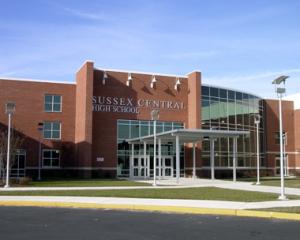DNREC hears Sussex woes
Delaware officials are soliciting help from the public to get rid of red tape and improve efficiency in state government, and environmental officials heard numerous complaints during a Jan. 7 public hearing.
To combat overregulation, Gov. Jack Markell in June signed Executive Order 36, establishing a process to review, modify and possibly eliminate certain state agency regulations.
A public hearing for regulations imposed by the Delaware Department of Natural Resources and Environmental Control at Sussex Central High School in Georgetown, drew a large, energetic crowd.
DNREC Deputy Secretary David Small opened the hearing by explaining the agency oversees state parks, energy, air, waste, water and fish and wildlife. “We’re trying to do this with an eye towards maintaining environmental standards,” he said.
Small said DNREC is obligated to follow federal Environmental Protection Agency standards, but the way in which those standards are met is up for review. “We’re here tonight really to listen to you all,” he said.
Some audience members testified the state is not beholden to the EPA. Homeowner Larry Mayo said the U.S. Constitution does not give the federal government authority over private land. Mayo said state representatives should have more control over him than the president. To legislators in the audience, Mayo said, “I’d like to see you guys grow a large set of kahunas.”
Positive Growth Alliance executive director Rich Collins said the EPA recently told Virginia it had to invest billions to regulate stormwater runoff. A U.S. District Court in Virginia ruled Jan. 3 that the EPA overstepped its authority, saying stormwater runoff is not a pollutant and cannot be regulated by the EPA, even if it is a vehicle for sediment, which is a pollutant.
Collins said he hopes the case will have an impact in Delaware.
Executive Order 36 was meant only to address regulations that are at least three years old, but recent septic regulations were repeatedly questioned during the hearing.
Under new septic regulations aimed at cleaning up the state’s waterways, DNREC will require enhanced nutrient removal systems for new or replacement systems for residents within 1,000 feet of Chesapeake Bay tidal waters. The systems will likely cost between $2,500 and $6,000. Inspection of the new systems, costing from $350 to $450, will be required every six months at the owner’s expense, and DNREC has the power to require more frequent inspections.
Collins said by requiring two inspections per year, the state is expecting the new systems to perform poorly.
He said residents are still struggling from the 2009 economic downturn and property values have gone down, including his own rental properties. He said when creating new regulations, DNREC should keep in mind residents’ net worth has decreased. Collins received applause from the audience for his comments.
Bob Coleman, an engineer and 30-year property owner in Sussex County, said residents want high air and water quality, but regulations seem created only to exert control, not to make a significant improvement in the environment.
Coleman said the state should stand up to the EPA when its standards become costly and frivolous. “Is there any practical sense to some of this regulation?” he asked.
Coleman said new septic regulations are overreaching, and strict controls on nitrogen impose severe financial hardships for people. “It just seems totally wrong to be clamping down on people unless there’s some benefit to be had,” he said.
Some audience members were concerned Executive Order 36 could lead to further encroachment on the inland bays.
Selbyville resident David Jaeger said as the economy in Sussex County improves, development will pick up. He said natural resources that attract people to Sussex could be exposed to pollution and overdevelopment if regulations are pulled back. “One of the main protectors of the Inland Bays watershed is DNREC,” Jaeger said.
Bill Moyer, president of the Inland Bays Foundation, said progress towards cleaning up the Inland Bays has stalled because of Sussex County Council’s failure to regulate development and because certain organizations in the county that believe positive growth is the freedom to develop without government interference.
Moyer said studies have shown protecting the environment actually creates jobs and improves the economy. Clean water means more fish, crabs and oysters, which benefits fisherman and restaurants and boosts tourism, he said.
Moyer said one pro-growth group wants to remove regulations without showing how their removal would benefit the local economy, and he accused the group’s leader of having a personal financial benefit for the removal of regulations.
Moyer said DNREC should give little credence to testimony that is not backed by scientific studies.
Small said residents could submit comments in writing until Friday, March 1. Comments can be mailed to Regulatory Comments Office of the Secretary DNREC, 89 Kings Highway, Dover, or submitted online at dnrec.delaware.gov. “This process isn’t closed tonight,” he said.





















































